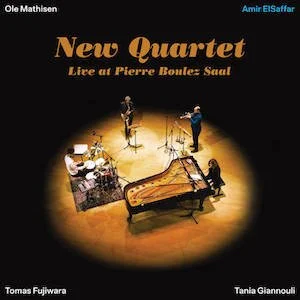Label: Maqam Records, 2025
Personnel - Amir ElSaffar: trumpet; Ole Mathisen: tenor saxophone; Tania Giannouli: microtonal piano; Tomas Fujiwara: drums.
Iraqi-American trumpeter and composer Amir ElSaffar expands his working trio—with saxophonist Ole Mathisen and drummer Tomas Fujiwara—into an impressive quartet with the addition of Greek pianist Tania Giannouli (she performs wonders on the microtonal piano). New Quartet Live at Pierre Boulez Saal was recorded in Berlin in 2023 and presents eight brilliant compositions that unfold like a suite, offering a clear window into ElSaffar’s contemporary ethno-jazz universe.
“Autumn Song” draws the listener into an engrossing modal tranquility, shaped by ElSaffar’s unerring, Middle Eastern–inflected fluidity, Giannouli’s triumphant piano chords that add an air of mystery, and Fujiwara’s impeccably coordinated drumming. Mathisen’s exchanges with the trumpeter suggest a sense of spiritual communion, while Giannouli’s textures introduce just enough strange, divergent tones to keep us transfixed. “Ghazlau” is another poignant maqam, with Giannouli channeling something of Alice Coltrane’s tonal stream, while ElSaffar sings with heartfelt intensity.
“Orientations I–V”, enriched by conspicuous piano clusters, finds the quartet navigating its distinct roles with a feeling of aural majesty. ElSaffar’s phrasing moves effortlessly from reflective to urgent, while Mathisen slips into an avant-garde register, underpinned by octave-driven piano figures and skittering drums. The piece briefly turns feverishly dreamlike before settling into a four-chord piano vamp. It then shifts again in texture to better serve the horns’ inventive interplay, ultimately concluding with an unaccompanied Fujiwara, whose percussion exploration displays striking technique, control, and emotional weight.
The horns, seemingly tailored to the mood of each piece, work independently yet in tacit agreement on “Dignity”, floating above Giannouli and Fujiwara’s rippling rhythmic waves. On “10:23 AM”, an odd-metered maqam energized by a contagious pulse, they run in parallel, generating a buoyant, lively bounce.
The minimalist “Le Marteau de la Maitresse” centers on prepared piano, producing a gong-like resonance that functions as a pedal point. Its dry, hypnotic quality favors delicate saxophone negotiations and elegant percussive restraint. “For the Victims of Genocide” unfolds as a brushed ballad steeped in dark hues and mournful solemnity.
The achievement feels even more remarkable when considering that the material was composed just three days before the concert. Balancing written structures and open forms with a deeply intuitive relationship to sound, ElSaffar’s New Quartet makes an impressive debut. Let yourself be carried by the laid-back warmth and tactile sensitivity of the trumpeter’s aesthetic vision.
Favorite Tracks:
02 - Autumn Comes ► 03 - Orientations I-V ► 10 - 10:23AM






